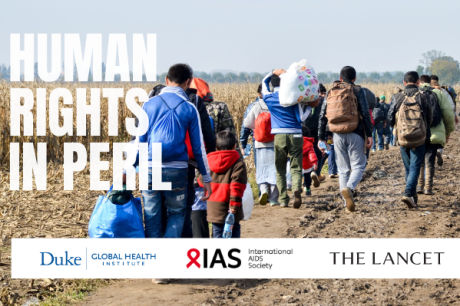
Duke Kunshan global health students with several DGHI professors: Jim Zhang (back, far left) and Shenglan Tang and Jeffrey Moe (back, far right).
Published November 4, 2018 under Education News
This fall, nine Master of Science in Global Health students from Duke Kunshan University are getting an authentic Duke experience. For the first time since the global health master’s program was established at Duke Kunshan in 2014, nearly the entire second-year cohort is spending a semester on campus in Durham, North Carolina.
Duke Kunshan University in Kunshan, Jiangsu province, China, is a partnership of Duke University and Wuhan University that offers five master’s degree programs and, as of this fall, an undergraduate program.
According to Shenglan Tang, a Duke Global Health Institute (DGHI) professor and executive director of global health programs at Duke Kunshan, one of the primary motivations for Duke Kunshan students to spend a semester at Duke is to gain access to a broader range of elective courses. “Duke Kunshan currently has only four full-time global health professors and, as a result, course options are more limited there,” said Tang.
Duan Zhao, a Duke Kunshan student from Dalian city, Liaoning province, China, noted, “I love the health systems course taught by [DGHI] Professor Jeffrey Moe and the money, sex and power course taught by Professor Kathi Weeks in the gender, sexuality and feminist studies department. These are two of the best classes I’ve ever taken.”
Another Duke Kunshan student, Jennifer Silva-Nash, who hails from Arkansas, noted that being at DGHI has allowed her to see global health through a wider lens. “Duke Kunshan is an incredible place with great professors,” she said, “but there’s a larger variety of researchers at DGHI, and that’s helped me better gauge where I may fit in best in the global health world.”
Kamilla Pinter, a Duke Kunshan student from Winnipeg in the Canadian province of Manitoba, is enjoying her demographics class with DGHI professor Giovanna Merli and her intermediate epidemiology class with DGHI professor Joseph Egger—two classes she couldn’t have taken at Duke Kunshan.
For Duke Kunshan students who have fieldwork mentors based in Durham, being on the Duke campus also provides an opportunity for them to work more closely with their mentor as they analyze their fieldwork data and start drafting their thesis. For example, despite working with them remotely since the spring, Zhao hadn’t met his advisors—Catherine Staton, João Ricardo Vissoci and Ashley Phillips—in person until this fall.
Another compelling reason to spend a semester at Duke is that, in China, where most of the Duke Kunshan students are from, six months or more experience living abroad opens up a wider range of career opportunities.
Spending time on the Duke campus has been a component of all of the other Duke Kunshan graduate programs, says Sarah Martin, assistant director for graduate admissions and special projects at DGHI, but until now, the only international aspect of the Duke Kunshan Master of Science in Global Health has been the ten-week fieldwork experience. “Given that the students are receiving a Duke degree, it makes sense for students to have some exposure to the Duke campus and what it means to be a Duke student,” she said. “Our colleagues at Duke Kunshan made a compelling argument in favor of the model, so we decided it was time to offer this option and see how it goes.”
Shuyu Guan, senior program coordinator for Duke Kunshan’s Master of Science in Global Health, helped prepare the students for their time on the Duke campus, coordinating with the Duke Graduate School, visa services and the DGHI education team. In addition to the knowledge the Duke Kunshan students gain from their diverse electives, she hopes they’ll hone their critical thinking and flexibility—essential skills for global health professionals.
Exposure to a larger community of global health students and speakers has also been a plus for the Duke Kunshan students. “My Duke Kunshan classmates and professors are amazing, but at DGHI, my classmates are from more diverse backgrounds,” said Silva-Nash. “I’ve had so many rich conversations, both inside and outside the classroom, and I’ve enjoyed being exposed to so many different viewpoints.”
Ying Yang, a Duke Kunshan student from Sichuan province, Jiuzhaigou County, China, echoes this sentiment: “I’ve made several new friends at Duke, some of them at DGHI and some of them from other programs. My interactions with them have expanded my horizons and enriched my life,” she said. Yang has also enjoyed participating in campus activities such as seminars, music performances and events promoting women’s empowerment.
In addition to his academic experiences, Zhao is also relishing the opportunity experience other aspects of American life: football, the midterm elections and soon, Christmas. “I’m excited to see the U.S. midterm elections close-up, especially given that its results may influence the world profoundly,” he said.
As Duke Kunshan expands its graduate and undergraduate offerings, Martin expects that a more seamless exchange of students between Duke and Duke Kunshan will emerge. Second-year DGHI master’s student Yolande Pokam is currently spending the semester at Duke Kunshan, and offering this opportunity to future DGHI students is certainly a possibility.
For now, though, most DGHI students will just experience Duke Kunshan vicariously through their new classmates.
Learn more about Duke Kunshan University’s Master of Science in Global Health program.


